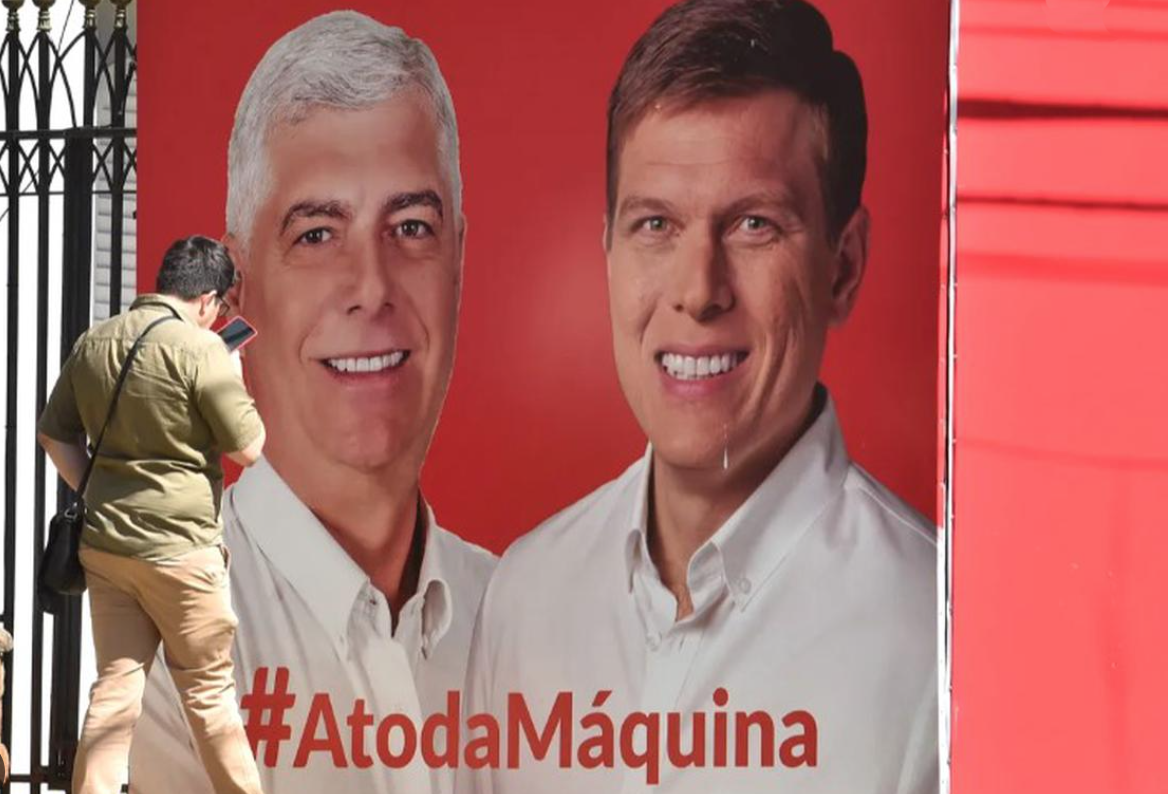Next Sunday, April 30, Paraguay will hold its eighth general elections since the end of Alfredo Stroessner’s authoritarian regime in 1989. Although 13 presidential and vice presidential candidates are running, the ruling Colorado Party, formed by Santiago Peña and Pedro Alliana, and the National Concertación for a New Paraguay, led by Efraín Alegre and Soledad Núñez, are the most likely to win.
The local polls, over which reigns a mantle of doubt and distrust due to their lack of methodological rigor, indicate in their majority a clear victory in favor of Peña, the Colorado candidate, between 10% and 13%. Only one of these polls gives the National Concertación leader as the winner by a narrow margin of around 4%. On the other hand, the international survey Atlas Latinoamérica indicates a triumph of the Concertación candidate by a slim margin of 2%. What both polls, the local and Atlas, coincide with is the favorable levels of voting intention toward the Paraguayan anti-establishment candidate “Payo” Cubas.
The polls of the last weeks have positioned Payo Cubas, of the National Crusade Party, at surprising levels of astonishing ascent, around 23% of voting intention. This former congressman with a disruptive profile, expelled from the Senate during this period for misconduct, defines himself as a “romantic anarchist” and has attracted with populist and authoritarian ideas a sector of the electorate that is fed up with traditional politics (and politicians). He is handicapped by the fact that he has no political structure on a national scale and not enough equipment to cover the polling stations.
According to all polls, other candidacies, such as those headed by Euclides Acevedo, of the New Republic Movement, and the ex-football player and far-right candidate José Luis Chilavert, have little prominence and little chance.
These new elections will be atypical, due to the following factors: the first one is the U.S. Department of State’s indictment of Hugo Velázquez (current vice president) and Horacio Cartes (Colorado Party’s president, and former President of the Republic) for corruption and the imposition of economic sanctions.
The second aspect is the electoral reform that has implied the incorporation of the preferential vote and the use of electronic voting machines that will be used for the first time in a general election in the country.
Finally, the third aspect is the emergence of the Concertación as a new political space, different from the traditional electoral alliances. This space brings together 23 parties and 2 opposition political movements. Therefore, has a plural and heterogeneous character.
What is at stake?
Alternation or continuity are the options presented to the Paraguayan electorate. The National Republican Association (ANR) or Colorado Party has held power since 1948, with a brief 5-year interruption between 2008 and 2013, when former bishop Fernando Lugo led an alliance of opposition parties that defeated the Colorado Party. Lugo’s mandate was interrupted a few months before it ended and his vice president, the liberal Federico Franco, finished the cycle.
As of 2013, the ANR regained power with Horacio Cartes and then with Mario Abdo Benítez. In the two cases, there is a common denominator: both Cartes and Benítez defeated Efraín Alegre, the Paraguayan opposition today’s candidate, for the third time. This time, Alegre has succeeded in bringing together practically the entire Paraguayan opposition, and his party, the Authentic Radical Liberal Party (PLRA), is the main partner and majority organization of the opposition.
Alegre is a historical PLRA politician with a vast political trajectory. He has been a congressman, senator, former Minister of Public Works, party president, and candidate for the Presidency of the Republic on two occasions. He is accompanied by Soledad Núñez, civil engineer, and former Minister of Housing during the Cartes government, and recognized for her trajectory in civil society organizations and as an entrepreneur.
The Colorado Party, on the other hand, will seek continuity in power through the candidacy of Santiago Peña. Peña was Minister of Finance in the Cartes government, and left the PLRA in 2016, to which he was affiliated, to continue as minister in the face of a demand by the governing board of the Colorado Party that all ministers should be members of the Colorado Party. Pedro Alliana, former president of the party and of the Chamber of Deputies, is accompanying Peña as vice president.
In this context, the electoral campaign has been characterized by moderate enthusiasm of the citizens and the limitations of the Colorado Party for campaign expenses, as a result of the economic sanctions imposed by the U.S. Department of State. This has not prevented the political violence of the speeches, especially on social networks, and the proliferation of false information, allegations of all kinds, and campaigns that sought to distract the attention of citizens to confuse them.
However, the Concertación gained prominence with the public presentation of a package of proposals with social content in the areas of energy, health, employment, and security, among others, which attracted the attention of public opinion. Peña emphasized employment and promised the generation of 500,000 jobs.
Unlike other cases in the region, the cleavage of these elections has not been ideological, but rather of opposition to country models and symbolic appeals to change or continuity. “The homeland or the mafia” has been the slogan chosen by Alegre to mark the difference with his political opponents of the Colorado Party and, more specifically, of the Honor Colorado movement, to which Peña belongs and which is led by Cartes.
Governability, the need to call for a broad political agreement to promote the fundamental reforms that the country needs and the strengthening of the institutional framework require, from whoever is elected, great political skill to lead this historic process.
On Sunday, April 30, the Paraguayan electorate will decide.
*Translated from Spanish by Janaína Ruviaro da Silva











